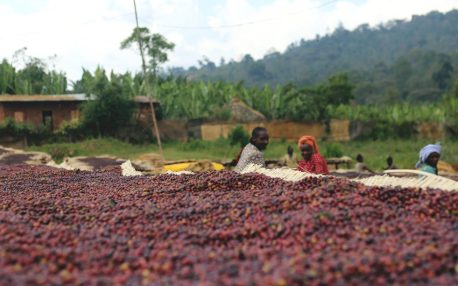Ethiopia Guji Dambi Uddo Natural
Here we find ourselves, coffee people, back in Ethiopia
for another great coffee. It only makes sense though. Why should we not return frequently to the ancestral home of all arabica coffees, especially when the beans in this lot are of the heirloom varietal? It truly seems that Ethiopian coffees are never going to disappoint us.
The history of Ethiopian coffees is so rich. For instance, the people who grew, harvested, and processed this coffee; the Oromo people of the Guji Region, still use the same traditional growing methods that they did in the 10th century.
The coffee cherries chosen for this lot come from 450 small holder (less than 5 acres) farms. The farmers delivered the ripest cherries to the Dambi Uddo washing station. At the washing station, the cherries are floated in water. Any damaged or underweight cherries float to the top and are removed. The remaining cherries (the best ones) are cleaned and then spread in a single layer in raised beds. The workers turn the cherries at regular intervals until they reach the desired moisture level. This is called the Natural Process. It is the most common processing method used for Ethiopian coffees. It is this process that brings to life the flavor
notes that set these coffees apart from any others in the coffee world.
This coffee is so good. It is smooth, with a lighter body, and medium acidity. It is a must try for sure. While enjoying this coffee, those with more discerning palates may discover flavor notes of strawberry, dried fruit, rose, and green tea.
